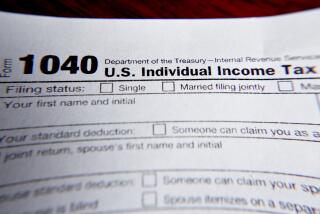Smokers Who Try to Quit May Get Tax Break
- Share via
WASHINGTON — Reversing a 20-year-old position, the Internal Revenue Service said that smokers trying to quit can claim some of the cost of the effort as a medical expense on their income tax returns.
Citing surgeon general reports since 1988 that nicotine is addictive and smoking harms health, the IRS concluded that programs and prescription drugs that help someone quit smoking are no different from efforts to treat alcoholism or drug addiction, which are tax-deductible.
“What the research of the last decade has documented is that this is one of the most powerful addictions that a person can succumb to,” said Dr. Michael Fiore, director of the Center for Tobacco Research and Intervention at the University of Wisconsin. “It’s not just some bad habit. It’s a dangerous, chronic disease.”
In revoking its 1979 position against the deduction, the IRS agreed: “A strong causal link exists between smoking and several diseases,” the agency said. “Nicotine, a substance common to all forms of tobacco, is a powerfully addictive drug.”
Taxpayers may now include among their medical deductions smoking-cessation programs offered by hospitals or other facilities, and prescriptions and doctor bills related to their stop-smoking effort.
Deductions will not be allowed for such nonprescription medications as nicotine patches or gum.
The total in medical expenses--smoking-related or otherwise--must reach 7.5% of a taxpayer’s adjusted gross income to qualify as an itemized deduction.
Eriksen said an increasing number of intensive programs are available, including some at drug treatment centers. There are also more and more pharmaceutical options, he said.
More to Read
Sign up for Essential California
The most important California stories and recommendations in your inbox every morning.
You may occasionally receive promotional content from the Los Angeles Times.












